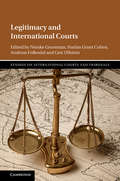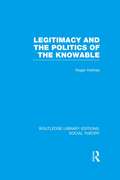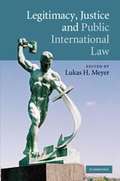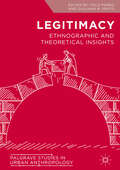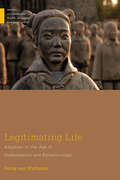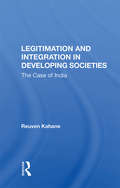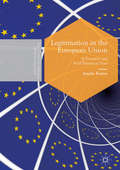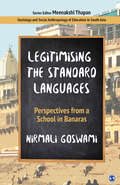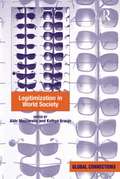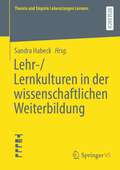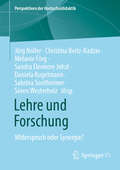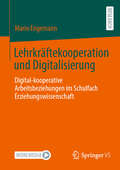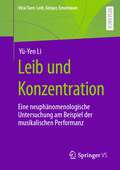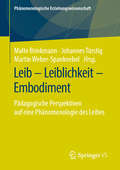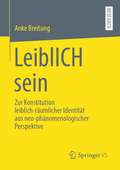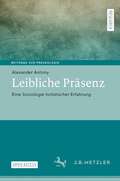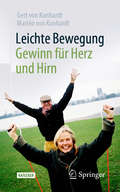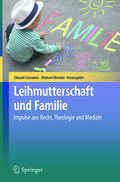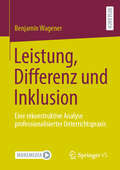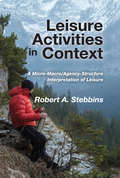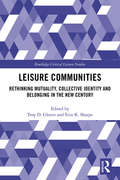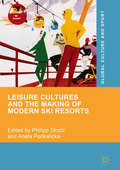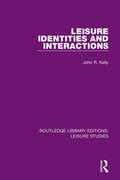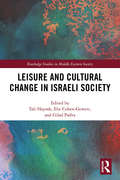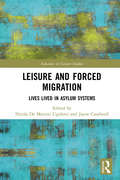- Table View
- List View
Legitimacy and International Courts (Studies on International Courts and Tribunals)
by Geir Ulfstein Andreas Follesdal Nienke Grossman Harlan Grant CohenOne of the most noted developments in international law over the past twenty years is the proliferation of international courts and tribunals. They decide who has the right to exploit natural resources, define the scope of human rights, delimit international boundaries and determine when the use of force is prohibited. As the number and influence of international courts grow, so too do challenges to their legitimacy. This volume provides new interdisciplinary insights into international courts' legitimacy: what drives and undermines the legitimacy of these bodies? How do drivers change depending on the court concerned? What is the link between legitimacy, democracy, effectiveness and justice? Top international experts analyse legitimacy for specific international courts, as well as the links between legitimacy and cross-cutting themes. Failure to understand and respond to legitimacy concerns can endanger both the courts and the law they interpret and apply.
Legitimacy and the Politics of the Knowable (Routledge Library Editions: Social Theory)
by Roger HolmesRoger Holme's work in social and industrial psychology is widely respected. The theme of this first collection of his essays is the relationship of the individual with the formal, value-laden group on the one hand and the scientifically known and the philosophically asserted on the other. Roger Holmes looks at the connexions between these two important relationships and considers them in terms of the interaction between the nature of society and the nature of the knowable. The areas covered include the derivation of social classes, the nature of morale and the emergence of the professions and the trade unions. Subjects relating to the theory of knowledge include the nature of cross-cultural data, the relationship between empiricism and psychoanalysis, and Marxism and the nature of groups. The author's main theoretical influences throughout have been psychoanalysis, which is treated sympathetically but critically, and Piaget; these influences are reflected in the main preoccupations of these essays.
Legitimacy, Justice and Public International Law
by Lukas H. MeyerDo states or individuals stand under duties of international justice to people who live elsewhere and to other states? How are we to assess the legitimacy of international institutions such as the International Monetary Fund and the United Nations Security Council? Should we support reforms of international institutions and how should we go about assessing alternative proposals of such reforms? The book brings together leading scholars of public international law, jurisprudence and international relations, political philosophers and political theorists to explore the central notions of international legitimacy and global justice. The essays examine how these notions are related and how understanding the relationships will help us comparatively assess the validity of proposals for the reform of international institutions and public international law.
Legitimacy: Ethnographic and Theoretical Insights (Palgrave Studies in Urban Anthropology #Vol. 12)
by Italo Pardo Giuliana B. PratoGlobal in scope, this original and thought-provoking collection applies new theory on legitimacy and legitimation to urban life. An informed reflection on this comparatively new topic in anthropology in relation to morality, action, law, politics and governance is both timely and innovative, especially as worldwide discontent among ordinary people grows. The ethnographically-based analyses offered here range from banking to neighbourhoods, from poverty to political action at the grassroots. They recognize the growing gap between the rulers and the ruled with particular attention to the morality of what is right as opposed to what is legal. This book is a unique contribution to social theory, fostering discussion across the many boundaries of anthropological and sociological studies.
Legitimating Life: Adoption in the Age of Globalization and Biotechnology (Medical Anthropology)
by Sonja van WichelenThe phenomenon of transnational adoption is changing in the age of globalization and biotechnology. In Legitimating Life, Sonja van Wichelen boldly describes how contemporary justifications of cross-border adoption navigate between child welfare, humanitarianism, family making, capitalism, science, and health. Focusing on contemporary institutional practices of adoption in the United States and the Netherlands, she traces how professionals, bureaucrats, lawyers, politicians, social workers, and experts legitimate a practice that became progressively controversial. Throughout the past few decades transnational adoption transformed from a humanitarian response to a means of making family. In this new manifestation, life becomes necessarily economized. While push and pull factors, demand and supply dynamics, and competition between agencies set the stage for the globalization of adoption, international conventions, scientific knowledge, and the language of human rights universalized the phenomenon. Van Wichelen argues that such technoscientific legitimations of a globalizing practice are rearticulating colonial logics of race and civilization. Yet, she also lets us see beyond the biopolitical project and into alternative ways of making kin.
Legitimation And Integration In Developing Societies: The Case Of India
by Reuven KahaneThis book focuses on general theoretical considerations important for the analysis of political legitimation and integration in diverse societies. It suggests a model of society in which conflicts are accentuated for integrative purposes.
Legitimation in the European Union: A Discourse- and Field-Theoretical View (Postdisciplinary Studies in Discourse)
by Amelie KutterThis book offers a transdisciplinary perspective on the question of how political legitimacy is constructed in the increasingly contested postnational setting of the European Union. Drawing on the example of the controversy about the EU constitution and the use of ‘EU constitution speak’ in commentaries published by Polish and French broadsheets, it reveals the transformation that constructions of political authority and association undergo when they are being transposed from the discourse field of multilateral negotiation to that of national news media. Through an original combination of the linguistic theory of discourse developed in Critical Discourse Analysis, Bourdieu’s field theory and notion of symbolic power, and political thought on polity-building, it develops a framework for the discourse study of legitimation and Europeanisation, and proposes applications beyond the case studies in the book.To students of European integration, it demonstrates the potential these concepts have for unravelling the implicit practices of postnational polity building. Discourse researchers, on the other hand, will discover how detailed text analyses gain significance in debates related to the macro level of political organisation when guided by sociological and political theory.
Legitimising Standard Languages: Perspectives from a School in Banaras (Sociology and Social Anthropology of Education in South Asia)
by Nirmali GoswamiThis book employs an ethnographic approach to explore the reproduction of class, status, and ethnic identities through the schooling process. Legitimising Standard Languages: Perspectives from a School in Banaras focuses on the introduction of official languages in schools. The primary objective of this work is to look at the socio-economic backgrounds of administrators, teachers, and students and their families vis-à-vis their influence on the languages in their lives, both in and outside school. It examines how the dominant languages are transmitted, transacted and negotiated in modern institutions. The author puts forth the cultural consequences of standardising and legitimising languages in educational institutions in a society where variability and diversity have otherwise been the norm.
Legitimization in World Society (Global Connections Ser.)
by Aldo Mascareño Kathya AraujoEmerging traits of late global modernity such as transnationalism, multiculturalism, individualization and supranational contexts of action raise the question of what holds society together. Responses have typically made reference to legitimization, but the modern world presents challenges to such responses, for in such a differentiated, globalized setting, legitimization can no longer appeal to the previous national, ideological or religious foundations of early modernity. From a variety of theoretical and empirical perspectives, this book explores the manner in which legitimization can be constructed by people, groups or institutions under the contemporary pressures and possibilities of modern world society. Drawing on cosmopolitan theory, postcolonial sociology, systems theory, and historical sociology, it engages with questions of human rights, processes of individualization and the constitution of transnational spaces in its examination of the challenges to legitimization. As such, it will be of interest to scholars of sociology, political science and social and legal theory, concerned with questions of globalization and the problems of social cohesion and legitimacy.
Lehr-/Lernkulturen in der wissenschaftlichen Weiterbildung (Theorie und Empirie Lebenslangen Lernens)
by Sandra HabeckDer Sammelband betrachtet Lehr-/Lernkulturen in der wissenschaftlichen Weiterbildung aus mikro-, meso- und makrodidaktischer Perspektive.Unter diversen theoretischen sowie forschungsmethodischen Zugängen werden in den Beiträgen zentrale Aspekte und Fragestellungen hinsichtlich des Lehrens und Lernens in der wissenschaftlichen Weiterbildung beleuchtet und analysiert. In den einzelnen Forschungsarbeiten rücken unter anderem kontextspezifische als auch fachkulturelle Differenzierungen, immanente Spannungsverhältnisse sowie schließlich bedeutsame Ausrichtungen der Lehr-/Lernkulturen in der wissenschaftlichen Weiterbildung in den Blick.
Lehre und Forschung: Widerspruch oder Synergie? (Perspektiven der Hochschuldidaktik)
by Jörg Noller Christina Beitz-Radzio Daniela Kugelmann Sabrina Sontheimer Sören Westerholz Melanie Förg Sandra Eleonore JohstDer Sammelband ist der Frage gewidmet, wie sich Forschung und Lehre zueinander verhalten. Hochschulmitarbeitende stehen vor der Herausforderung, Forschung und Lehre in einem Spannungsfeld aus Anreizsystemen, Zeitmangel und persönlichen Interessen unter einen Hut zu bringen. Dabei wird der Renommee bringenden Forschung oftmals der Vorzug gegeben, die Lehre dabei zum notwendigen Übel reduziert. Doch stehen Forschung und Lehre wirklich in einem Widerspruch? Oder ist es nicht auch möglich, dass die Forschung durch die Lehre, und die Lehre durch die Forschung profitiert, so dass zwischen beiden eine synergetische Wechselwirkung bestehen kann?
Lehrkräftekooperation und Digitalisierung: Digital-kooperative Arbeitsbeziehungen im Schulfach Erziehungswissenschaft
by Mario EngemannDie Herausforderungen des digitalen Transformationsprozesses tangieren das öffentliche und private Leben – davon ist selbstredend auch die Schule und der Unterricht betroffen. Zugleich gilt die Lehrkräftekooperation als eine Möglichkeit, um gesellschaftlichen Herausforderungen in Schulen begegnen zu können. Davon ausgehend untersucht Mario Engemann die digital-kooperativen Arbeitsbeziehungen von Lehrkräften – exemplarisch am gymnasialen Schulfach Erziehungswissenschaft. Unter Rückgriff auf ein Mixed-Methods-Design beantwortet er die Frage, wie sich die Lehrkräftekooperation hinsichtlich der Digitalisierung in Formen, Gestaltung und Rahmenbedingungen darstellt. Die empirische Datenbasis der Arbeit bilden ein eigens unter Berücksichtigung bestehender Items zur Lehrkräftekooperation konzipierter quantitativer Fragebogen sowie Expert*inneninterviews mit Lehrkräften.
Leib und Konzentration: Eine neuphänomenologische Untersuchung am Beispiel der musikalischen Performanz (Vital Turn: Leib, Körper, Emotionen)
by Yü-Yen LiUnter Bezugnahme auf die Neue Phänomenologie von Hermann Schmitz und auf der Grundlage eigener Konzerterfahrungen geht die Autorin erstmals dem Zusammenhang von Leib und Konzentration nach. Sie zeigt, dass Konzentration nicht bloß eine gedankliche Selbstdisziplinierung ist, sondern primär das Gewahren der eigenen Gefühlswelt erfordert. Dabei gelingt ihr ein Brückenschlag zwischen Theorie und Praxis: zum einen leistet sie einen Beitrag zur Phänomenologie der Konzentration und zur Philosophie der Emotionen, zum anderen erschließt sie professionellen Musikern und Musikpädagogen eine leibphänomenologische Zugangsweise zur musikalischen Praxis.
Leib – Leiblichkeit – Embodiment: Pädagogische Perspektiven auf eine Phänomenologie des Leibes (Phänomenologische Erziehungswissenschaft #8)
by Malte Brinkmann Johannes Türstig Martin Weber-SpanknebelIn diesem Band werden ausgehend von systematischen Studien zum Verhältnis von Leib, Lernen, Bildung und Erziehung neue Impulse aus der empirischen Bildungsforschung, den Neurowissenschaften und der Postphänomenologie aufgegriffen: Phänomenologische und pädagogische Perspektiven auf Leiblichkeit und Embodiment werden mit diskurs- und praxistheoretischen, neurophänomenologischen sowie Perspektiven der Gender Studies verknüpft und auf die pädagogischen Praxisfelder Digitalisierung, Schule und Kindergarten bezogen.
LeiblICH sein: Zur Konstitution leiblich-räumlicher Identität aus neo-phänomenologischer Perspektive
by Anke BreitungKonstruktivistische Raumvorstellungen prägen in vielen Disziplinen die Beschäftigung mit räumlichen Dimensionen von Identitäten. Auch in der raumbezogenen Identitätsforschung dominiert eine dualistische Sichtweise, die den Körper vom Geist und den Menschen von seiner Umwelt trennt. Ortsbezogene, lokale und auch materielle Kontexte sowie die leiblichen, affektiven oder irrationalen Dimensionen unserer Erfahrungen werden außer Acht gelassen, die für Menschen zentral im Rahmen ihrer Identitätsarbeit sind. Aus diesem Grund plädiert Anke Breitung für einen holistischen Ansatz und macht dazu eine neo-phänomenologische Perspektive für die Identitätsforschung fruchtbar. Dabei werden die räumlichen Bezüge menschlicher Identitätsarbeit vom leiblichen Dasein des Menschen aus entworfen. So gelingt es ein radikal neues leiblich-räumlich-zentriertes Identitätsmodell zu entwerfen. Damit leistet die Autorin einen wichtigen Beitrag, um zu verstehen, wie die Ganzheit der sich durch uns aufspannenden Umwelt in komplexer und dynamischer Art und Weise auf die Konstruktion unseres Selbst reflexiv Einfluss nimmt.Die Autorin:Anke Breitung war als wissenschaftliche Mitarbeiterin in der Arbeitsgruppe Humangeographie der Katholischen Universität Eichstätt-Ingolstadt tätig. Ihre Schwerpunkte liegen in den Bereichen (Neo-)Phänomenologie bzw. Raumphänomenologie, Medizinische Geographie, Raumbezogene Identitätsforschung sowie Stadtgeographie und Geographische Handelsforschung.
Leibliche Präsenz: Eine Soziologie holistischer Erfahrung (Beiträge zur Praxeologie / Contributions to Praxeology)
by Alexander AntonyIn welcher Hinsicht können körperlich-leibliche Erfahrungen als Teil sozialer Aktivitäten verstanden werden und wie kann man sie sozialwissenschaftlich untersuchen? Unter Rückgriff auf den klassischen Pragmatismus, insbesondere John Dewey, und soziologische Praxistheorien leistet Alexander Antony einen Beitrag zur Beantwortung dieser Fragen. Er entwickelt eine Soziologie leiblicher Praxis, welche Sozialtheorie, methodologische Reflexion und die Erforschung der Produktion ge- und erlebter Körperlichkeit miteinander verschränkt. Empirisch widmet sich das Buch aus einer diskursanalytischen und ethnographischen Perspektive der Praktik der Atemarbeit, einem „ganzheitlichen“ Therapie- und Selbsterfahrungsangebot. Die Atemarbeit zielt darauf, eine bewusst erlebte leibliche Selbstbezüglichkeit zu etablieren, um derart körperliches, psychisches und seelisch-spirituelles Wohlbefinden zu befördern. Auf unterschiedlichen Analyseebenen spürt der Autor der Frage nach, wie individuelles leibliches Erleben und die diskursive und soziomaterielle Produktion von Erfahrungssituationen zusammenspielen. Die zentrale Einsicht: Sozialität geht buchstäblich unter die Haut.Dies ist ein Open-Access-Buch.
Leichte Bewegung - Gewinn für Herz und Hirn
by Gert von Kunhardt Marlén von KunhardtBewegung, die Arznei für schlaue Leute! Dieses Buch zeigt Ihnen, wie Bewegung zur Prävention von und als Heilmittel bei Krankheiten und Beschwerden eingesetzt werden kann. Der Vorteil dieses Rezeptes von Bewegung liegt auf der Hand: es verursacht kaum Kosten und hat bei sanfter Dosierung keinerlei Nebenwirkungen. Ob alt oder jung, draußen oder drinnen, ob erschöpft, unlustig oder nur zu bequem: hier kommt jeder ins Laufen und Gehen. Das hebt die Stimmung, wirkt im Gehirn wie eine leise Droge und produziert zahlreiche Glückshormone. Stress wird abgebaut und Angst gedämpft. Nicht nur funktionieren, sondern leben. Mehr Benefit durch Bewegung. Das Autorenteam vermittelt überzeugt: Bewegung ist ein geniales Psychopharmakon und verbessert die Hirnleistung dramatisch. Erfahren Sie, wie leicht es ist, dies für sich und andere, Erwachsene sowie Kinder, umzusetzen. Zum Autorenteam: Gert von Kunhardt ist Somatologe mit dem Ehrentitel Senator h.c. im Gesundheitssenat des Berufsverbandes der Präventologen. Marlén von Kunhardt ist Pädagogin und Beraterin in Gesundheitsfragen. Beide zählen zu den bekanntesten Trainerpaaren Deutschlands und haben bereits über 25 Titel zur Gesundheitsoptimierung veröffentlicht.
Leihmutterschaft und Familie: Impulse aus Recht, Theologie und Medizin
by Edward Schramm Michael WermkeDas Buch betrachtet das Thema Leihmutterschaft aus einer breit angelegten, interdisziplinären Perspektive. In Deutschland ist die Leihmutterschaft verboten, in vielen anderen Ländern legal. Viele Menschen erfüllen sich den Wunsch nach einem Kind daher im Wege einer Leihmutterschaft im Ausland. Das Buch nimmt dies zum Anlass, aktuelle Erkenntnisse und Impulse aus der Rechtswissenschaft, Theologie, Soziologie, kindlichen Entwicklungspsychologie, Medizin, Genetik und Philosophie zu diesem Phänomen aufzugreifen und zu analysieren. Im Mittelpunkt steht die Frage, inwiefern sich das Wohl des Kindes, die Interessen der Leihmütter sowie die Bedürfnisse der Wunscheltern in der deutschen Rechtsordnung, der sozialen Wirklichkeit und den kirchlichen Institutionen widerspiegeln.
Leistung, Differenz und Inklusion: Eine rekonstruktive Analyse professionalisierter Unterrichtspraxis
by Benjamin WagenerWährend der Zusammenhang von sozialer Ungleichheit und schulischem Leistungsprinzip durchaus im Fokus empirischer Forschung steht, stellt die Analyse des Herstellungsprozesses von Differenz und Ungleichheit im Vollzug von Unterricht nach wie vor ein Desiderat dar. Der Zugang zur Unterrichtspraxis setzt wiederum ein komplexes methodisches Vorgehen voraus. Anhand von Unterrichtsvideographien rekonstruiert der Autor unterschiedliche Praxen leistungsbezogener Differenzkonstruktionen in Gymnasien und in Sekundarschulen mit einer inklusiven Programmatik. Die empirischen Ergebnisse, die in der Tendenz auf schulform- und fachspezifische Unterschiede verweisen, reflektiert er im Hinblick auf Professionalisierung in praxeologischer Perspektive sowie mit Bezug auf den aktuellen Diskurs um schulische Inklusion.
Leisure Activities in Context: A Micro-Macro/Agency-Structure Interpretation of Leisure
by Robert A. StebbinsThere have been many analyses of leisure, drawing on the social, historical, cultural, temporal, and geographical contexts in which acts of leisure are pursued. Yet these studies lack a theoretical framework that can explain how leisure studies interact in various social contexts (cultural, temporal, or geographical), or as Robert A. Stebbins conceptualizes it, at levels of society. Here Stebbins explores leisure studies at society's micro, meso, and macro levels. He considers all three as they manifest themselves in the everyday pursuit of leisure, while focusing on the heretofore neglected middle, which he calls the meso side of life. Stebbins not only draws these perspectives together, but does something no one else has: he focuses on the big picture of leisure. Leisure Activities in Context examines the entire micro-macro/agency-structure dimension, using theory and research from leisure studies and the sociology of leisure as the vehicles to accomplish this. This book will be a useful theoretical sourcebook on the study of leisure because it provides a blueprint of issues that scholars and students can use to draw deeper meaning from their own studies, and a framework for future research.
Leisure Communities: Rethinking Mutuality, Collective Identity and Belonging in the New Century (Routledge Critical Leisure Studies)
by Troy D. Glover Erin K. SharpeThis book analyses the concept of community by critically exploring its many manifestations in leisure. It unpacks patterns of mutuality, collective expression, and belonging as they emerge through interaction, shared narrative, and practice. Recognizing that our experiences of “being in common” and “being in leisure” require rethinking in a changed modernity, the book illustrates the myriad ways that leisure communities take form and shape in the current economic, political, and ideological moment. It highlights how changing societal expectations, economic conditions, technological innovations, and ideological shifts set the stage for a reformulation of social relations and emergence of new leisure-based social groupings. The authors question how to make sense of new social expressions, at times offering unexpected and completely new ways of theorizing community. Global in richness and scope, the book offers a rich and composite view regarding how to take up and theorize leisure in relation to the multiple dimensions of community. It will inspire a new generation of readers in a broad range of areas across the social sciences, including sociology, community studies, leisure studies, and planning.
Leisure Cultures and the Making of Modern Ski Resorts (Global Culture and Sport Series)
by Philipp Strobl Aneta PodkalickaThis edited volume offers an historical perspective on the creation of a global mass industry around skiing. By focusing on the ski resort as loci par excellence for global exchange, the contributors consider the development of skiing around the world during the crucial post-war years. With its global lens, Leisure Cultures and the Making of Modern Ski Resorts highlights both commonalities and differences between countries. Experts across various fields of research cover developments across the ski-able world, from Europe, Asia and America to Australia. Attention to media and material cultures reveals an insight into global fashions, consumption and ski cultures, and the impact of mainstream media in the 1960s and 1970s. This global and interdisciplinary approach will appeal to history, sociology, cultural and media research scholars interested in a cultural history of skiing, as well as those with more broad interests in globalization, consumption research, and knowledge transfer.
Leisure Identities and Interactions (Routledge Library Editions: Leisure Studies)
by John R. KellyFirst published in 1983. Leisure has too often been approached as a set of activities that people do when everything important has been completed. This text provides a different analysis demonstrating the centrality of leisure to human development and to important relationships. In Leisure Identities and Interactions the author analyses leisure in the context of role changes through the life course, but also as a social context in which we work out the identities that express who we really want to be. His focus is on the kinds of leisure that are both most common and most significant face-to-face encounters, family interaction, and episodes found in the midst of our roles and routines. Varieties of leisure styles are found to be developed out of available opportunities and in relation to cultural values, but also are chosen to express and negotiate our self-definitions. Leisure is both social and existential and can best be understood in the dialectic of role expectations and decision. Kelly utilizes symbolic interaction, interpretive, and dramaturgical metaphors to develop a different sociology of leisure one that brings together the concepts of role and identity. Expressive identities and intimate communities are as essential to leisure as they are to life.
Leisure and Cultural Change in Israeli Society (Routledge Studies in Middle Eastern Society)
by Elie Cohen-Gewerc Gilad Padva Tali HayoshProviding an inclusive, yet multi-layered perspective on leisure cultures in dynamic hegemonic, subcultural, and countercultural communities, this volume investigates the disciplinary and interdisciplinary aspects of leisure studies in the age of mass migration, nationalism, cultural wars, and conflicted societies in Israel. The Israeli society struggles with complicated geopolitical, intercultural, economic and security conditions since the establishment of the State of Israel. Consequently, the emergent leisure cultures in Israel are vibrant, diversified, exuberant and multifaceted, oscillating between Western and Middle Eastern tendencies. The chapters in this edited volume reflect dramatic influences of globalization on Israeli traditions, on one hand, and emergent local practices that reflect a communal quest of originality and authenticity, on the other hand. This book opens up a critical perspective on the tension between contested leisure cultures which are interconnected with spatial and temporal changes and interchanges. Examining leisure as a part of social, interethnic, physical, gendered and sexual changes, the volume is a key text for scholars and students interested in leisure culture, Israeli society, education, cultural and media studies and the Middle East.
Leisure and Forced Migration: Lives Lived in Asylum Systems (Advances in Leisure Studies)
by Nicola De Martini UgolottiThis book offers a timely and critical exploration of leisure and forced migration from multiple disciplinary perspectives, spanning sociology, gender studies, migration studies and anthropology. It engages with perspectives and experiences that unsettle and oppose dehumanising and infantilising binaries surrounding forced migrants in contemporary society. The book presents cutting edge research addressing three inter-related themes: spaces and temporalities; displaced bodies and intersecting inequalities; voices, praxis and (self)representation. Drawing on and expanding critical leisure studies perspectives on class, gender, sexuality and race/ethnicity, the book spotlights leisure and how it can interrogate and challenge dominant narratives, practices and assumptions on forced migration and lives lived in asylum systems. Furthermore, it contributes to current debates on the scope, relevance and aims of leisure studies within the present, unfolding global scenario. This is an important resource for students and scholars across leisure, sport, gender, sociology, anthropology and migration studies. It is also a valuable read for practitioners, advocates and community organisers addressing issues of forced migration and sanctuary.
